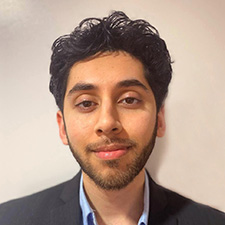The inner workings of the human body are one of the first topics medical students cover, generally through studying anatomy and conducting dissections. Through exploring that topic, Shamsh Shaikh, a medical student at Boston University School of Medicine (BUSM), gained an interest in cardiac physiology.
As his interest in the workings of the heart took root, he also witnessed the surge in e-cigarette use among younger Americans. That spurred Shaikh to create a poster presentation—titled “The Effect of Pod-based E-cigarettes on Endothelial Cell Phenotype: Preliminary Results”—on the topic. The work earned him a spot in the AMA Research Challenge.
To advance to the research challenge, Shaikh’s poster was selected as the top five poster presentations from the AMA Research Symposium, the largest research event for medical students, residents and international medical graduates, this past December.
To get to five, the research symposium began with 1,000 submissions. Approximately 500 of which were selected for presentation in a virtual Research Symposium poster gallery. Of those, the top scored posters were featured in a poster competition and voted on by participants. The final group of five posters represents the innovative thinking needed to drive medicine forward. The finalists cover a wide variety of topics, including the effects of electronic cigarettes, ventilator access during the pandemic and emotional intelligence in relation to burnout.
The next step in the process—the inaugural AMA Research Challenge—offers the five finalists the chance to present to a group of experts in medicine. The event will premiere on YouTube Jan. 13 at 7 p.m. CT. In advance of that competition, Shaikh offered some insight on his project.
AMA: What drew you to your research topic?
Shaikh: As a first-year medical student in anatomy class, I had the honor and privilege of dissecting a human heart with a small group of my classmates. Ever since that moment, I became fascinated with cardiac physiology and anatomy — both of which were incredibly complex topics that surprisingly followed many of the same principles I had practiced during my undergraduate studies as a Biomedical Engineering major.
In the real world and outside of our school bubble, we were witnessing an alternate epidemic with an immense surge in popularity of e-cigarette devices such as JUUL — especially among children and adolescents. I was fortunate enough to connect with Dr. Naomi Hamburg (Whitaker Cardiovascular Institute) via BUSM’s Medical Student Summer Research Program in 2019. I thank her deeply for helping me develop this research project.
AMA: Poster presentations are typically done in-person. As with so many things this year, this event had to go virtual. What was the experience like doing a virtual poster presentation?
Shaikh: The virtual symposium had the added benefit of convenience, and I was able to partake during down time while working at the hospital.
AMA: How have you managed your workload as a medical student as well as your poster research?
As a recipient of a National Heart, Lung, and Blood Institute grant, I was granted dedicated research time during the summer in between our first and second years of medical school. I continued to work on projects part time in Dr. Hamburg’s lab throughout second-year, spending free mornings (many of my classmates and I would watch the recorded lectures later that night) and occasionally weekends assisting with experiments.
I am thankful to my lab for their continued support and for providing critical feedback regarding my poster presentation.
AMA: What connection do you see between your research and your career path?
Shaikh: I believe that being introduced to translational research early-on in my medical career was paramount to my success thus far. Now as a third-year student in the middle of my clinical rotations, I have a much deeper appreciation for the nuances of each specialty choice. Though I am still fond of internal medicine as a potential career path with a specific focus on cardiology, I can also see myself as a future surgeon or Critical Care physician. Above all, however, research has provided me with a platform to apply my technical engineering background to projects with bountiful clinical implications.
AMA: What is next for your research endeavors?
Shaikh: Great question! I have really been able to dive into research this year and am proud to be working on several unique projects, ranging from investigating the link between COVID-19 and cerebral venous strokes to analyzing the use of ipsilateral venous bypass grafts to treat lower extremity vascular injuries. I am also working on a larger quality improvement project aiming to reduce catheter-associated urinary tract infections in our post-operative surgical patients.
A sincere thank you to my wonderful mentors at Boston Medical Center in the departments of cardiology, surgery, and interventional neuroradiology for their guidance.




